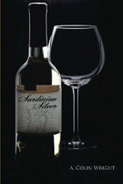 |
Sardinian Silver by A. Colin Wright iUniverse
book review by Peter M. Fitzpatrick
"In Sardinia, everywhere, surrounded by tourists as I was, I so much wanted union, complete, with another person."
Can men write a good romance? Yes, they can, even though millions of romance novels authored by women may have left the impression that men are more suited to the spy or mystery genre. After all, aren't women supposed to be the emotional ones? This novel helps explode that cultural myth. Men obviously have feelings and even thoughts about them too. Writers like Wright help map out this rugged landscape of masculine desire and yearning in a concise and evocative prose that subtly lifts the curtain on the softer parts of manhood, ones that countless men have been trained to leave untouched and unexplored. Hovering between memoir and confessional first person narrative, Sardinian Silver embodies in words a young man's encounter with the foreign culture and people of the Mediterranean island named Sardinia in 1962. For him, full engagement with this romantic "otherness" needs to be fulfilled erotically, physically, sexually—with all senses and emotions engaged. This erotic desire seems destined to be thwarted by the very foreignness that so beguiles, its contours so rigidly formed by the strict sexual repression of Sardinian culture. His overcoming of these forces of the past—with all its ignorance, prejudice, and hate toward women who venture sexual experience before marriage—exists in almost heroic tension with his desire to belong to this world and make peace with it.
This is a novel that is all about a Sense of Place. That is one of the critiques of our shrunken world with its cheap airline tickets, satellites, and Internet connections, its big box conglomerates and fast food sameness; no Sense of Place. It is not self-consciously that the author's skill is in presenting this slice of time as a living experience, with all its existential pain and desires, all the living and breathing questioning of religion and philosophy that every young man and woman encounters as they learn to question and test the ideals that parents, church, and schools have taught them. It is perhaps unwise to over-romanticize this lost world, but at the same time it is valuable to remember it. That is one of the hidden values of this innocent-looking work. It makes us understand that there was something there, something unique, and something now forever gone. It is sad, like a lost love, a lost friend, a lost innocence. Nonetheless, it is beautiful.
